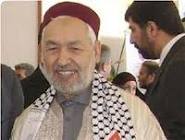Rashid al-Ghannushi: A Leader of Pure Islam
Rashid al-Ghannushi: A Leader of Pure Islam

Rashid Al- Ghannushi is one of the most influential leaders among Muslim
activists and intellectuals in Tunisia and the rest of the world who
represents a moderate and progressive strand in Arab Islamist politics.
His eventful life presents an example for all especially for the youth.

Shaikh Rashid Al-Ghannushi was born at al-Hama, in the Qabis province of southern Tunisia in 1941.
After successful completion of primary and secondary education, he
achieved the certificate of attainment degree, equivalent to the
Baccalaureate degree from the University of Zaytuna in 1962. In 1964, he
got admission in school of agriculture at Cairo University but left for
Syria without completion his course due to the eviction of Tunisians
from Egypt by Gamal Abdel Nasser and completed his graduation from
University of Damascus in Philosophy in 1968. In the meantime, Dr.
Rashid joined the European Socialist Party, but later entered an Islamic
life and established an Islamic party.
After graduation, he spent a year at Sorbonne in France before returning
to Tunisia and worked within a group called “Call Reporting And
Advocacy Group” and founded an organization with other Tunisians to
reform the Tunisian society based on Islamic Shariah.
Furthermore, his professional life was begun as a professor of
Philosophy in Tunisia in 1969. In addition to his profession, this
scholar tried to sermonize Islamic beliefs through lectures in classroom
as well as mosque and writing articles in newspaper (Sabah-Morning),
Magazine (The knowledge) and books.
Inspiring by the real spirit of Islam, he established an Islamic
movement called “al-ittijah al-islami” or Islamic Tendency Movement in
Manouba in 1979 which was renamed Hizb al-Nahda (or Hizb Ennahda) in
1989 or called as the Renaissance Party and began its activities without
publicizing formally till 1981. Rashid proclaimed the news of newly
founded party in 1981 through a press conference when the Tunisian Ruler
Al- Borguiba gave the political freedom.
This Movement became much popular within few months because of its Islam
loving, pacifist and patriotic mood as it called for a “reconstruction
of economic life on a more equitable basis, the end of single-party
politics and the acceptance of political pluralism and democracy. He
also published a magazine called “Al-Ma’refah” to shield his ideals.
However, an ideological conflict occurred between the government and
Al-Ghannushi in the same year. As a result, by the end of July,
Al-Ghannushi with his followers was arrested, sentenced to eleven years
in prison in Bizerte, and were agonized. He was released in 1984 due to a
large number of people including religious and secular community
demonstrated for his release. But again arrested in 1987 and let out in
1988 after one year imprisonment. He moved to Europe as a political
exile, and lived there from the early 1990s to the early 2011 and has
returned home from London on 30 January in 2011 after 22 years in exile
following the ousting of President Ben Ali earlier this month. In 1993
Britain granted him political asylum.
In 1984, he obtained certificates of proficiency in search of the
Faculty of Shariah and continued his doctoral thesis on the topic
“public freedoms in the Islamic state” but could not finalize the
doctorate degree due to the imprisonment.
In fact, Rashid Al-Ghannushi was determined to reform the Tunisian
society and culture according to the light of Islamic Shariah consistent
with the home culture. To insure social justice, equity and equality,
he accentuated on worker’s rights, unionism, and women’s rights
including women’s education, participation, respect, choice of home and
marriage, political participation, ownership of property, and freedoms
to follow Shariah and finally the democratic rights of general people.
Women responded positively as they returned to Islam by expelling the
western superficial liberation of women. Because Before the emergence of
the Islamist movement, woman found herself in an unstable and decaying
society whose “liberation” was purely superficial: nudity, eroticism,
leaching the house and the intermingling of the sexes. But Islamists
present the respectful position of women in the society and implemented
that through participation in their organization.
Al-Ghannushi is the author of many books on social, religious and
philosophical issues, some of his important writings are : Islamic
movements and Palestine, Public freedoms in the Islamic state, We and
the West (jointly),From the experience of the Islamic Movement in
Tunisia, So when Ibn Taymiyya,Rapprochement in the secular and civil
society, The Islamic movement and the issue of change, The Palestinian
issue crossroads between paths, Women between the Quran and the reality
of Muslims, Citizenship rights in the Islamic state, The difference
right , the duty to unity , The movement of Imam Khomeini and revival of
Islam’s life.
Some of his books were translated into other languages including
English, French, Turkish and Persian and have published in Egypt, Iran,
Tunisia, Turkey, and Algeria.
He visited many countries including UK, Iran, Sudan, Lebanon etc.
Finally, it can be said that, Rashid Al- Ghannushi faces different types
of obstacles but could not bow down to the injustice. This is why some
researchers submitted their doctorate studying on his thoughts called
Azzam Tamimi (political thought of Ghannouchi). The life of Al-
Ghannushi is the great source of learning for us.


কোন মন্তব্য নেই:
একটি মন্তব্য পোস্ট করুন